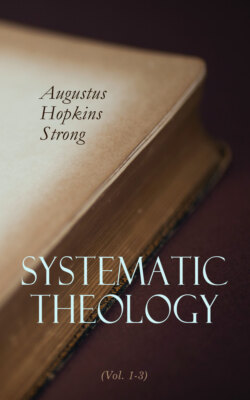Читать книгу Systematic Theology (Vol. 1-3) - Augustus Hopkins Strong - Страница 4
На сайте Литреса книга снята с продажи.
Table of Contents
ОглавлениеPreface
Part I. Prolegomena.
Chapter I. Idea Of Theology.
I. Definition of Theology.
II. Aim of Theology.
III. Possibility of Theology.
IV. Necessity of Theology.
V. Relation of Theology to Religion.
Chapter II. Material of Theology.
I. Sources of Theology.
II. Limitations of Theology.
III. Relations of Material to Progress in Theology.
Chapter III. Method Of Theology.
I. Requisites to the study of Theology.
II. Divisions of Theology.
III. History of Systematic Theology.
IV. Order of Treatment in Systematic Theology.
V. Text-Books in Theology.
Part II. The Existence Of God.
Chapter I. Origin Of Our Idea Of God's Existence.
I. First Truths in General.
II. The Existence of God a first truth.
III. Other Supposed Sources of our Idea of God's Existence.
IV. Contents of this Intuition.
Chapter II. Corroborative Evidences Of God's Existence.
I. The Cosmological Argument, or Argument from Change in Nature.
II. The Teleological Argument, or Argument from Order and Useful Collocation in Nature.
III. The Anthropological Argument, or Argument from Man's Mental and Moral Nature.
IV. The Ontological Argument, or Argument from our Abstract and Necessary Ideas.
Chapter III. Erroneous Explanations, And Conclusion.
I. Materialism.
II. Materialistic Idealism.
III. Idealistic Pantheism.
IV. Ethical Monism.
Part III. The Scriptures A Revelation From God.
Chapter I. Preliminary Considerations.
I. Reasons a priori for expecting a Revelation from God.
II. Marks of the Revelation man may expect.
III. Miracles, as attesting a Divine Revelation.
IV. Prophecy as Attesting a Divine Revelation.
V. Principles of Historical Evidence applicable to the Proof of a Divine Revelation.
Chapter II. Positive Proofs That The Scriptures Are A Divine Revelation.
I. Genuineness of the Christian Documents.
II. Credibility of the Writers of the Scriptures.
III. The Supernatural Character of the Scripture Teaching.
IV. The Historical Results of the Propagation of Scripture Doctrine.
Chapter III. Inspiration Of The Scriptures.
I. Definition of Inspiration.
II. Proof of Inspiration.
III. Theories of Inspiration.
IV. The Union of the Divine and Human Elements in Inspiration.
V. Objections to the Doctrine of Inspiration.
Part IV. The Nature, Decrees, And Works Of God.
Chapter I. The Attributes Of God.
I. Definition of the term Attributes.
II. Relation of the divine Attributes to the divine Essence.
III. Methods of determining the divine Attributes.
IV. Classification of the Attributes.
V. Absolute or Immanent Attributes.
VI. Relative or Transitive Attributes.
VII. Rank and Relations of the several Attributes.
Chapter II. Doctrine Of The Trinity.
I. In Scriptures there are Three who are recognized as God.
II. These Three are so described in Scripture that we are compelled to conceive of them as distinct Persons.
III. This Tripersonality of the Divine Nature is not merely economic and temporal, but is immanent and eternal.
IV. This Tripersonality is not Tritheism; for, while there are three Persons, there is but one Essence.
V. The Three Persons, Father, Son, and Holy Spirit, are equal.
VI. Inscrutable, yet not self-contradictory, this Doctrine furnishes the Key to all other Doctrines.
Chapter III. The Decrees Of God.
I. Definition of Decrees.
II. Proof of the Doctrine of Decrees.
III. Objections to the Doctrine of Decrees.
IV. Concluding Remarks.
